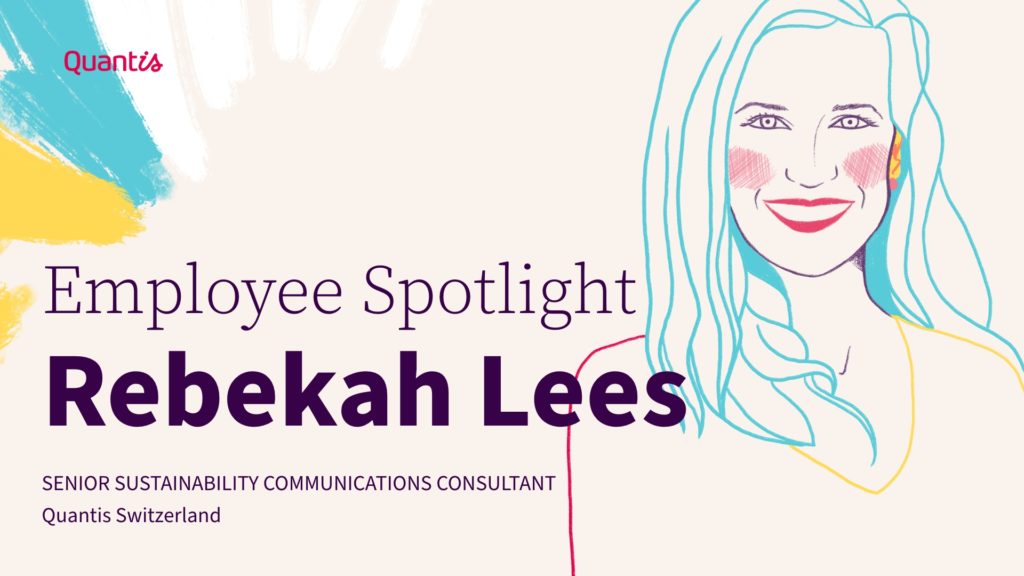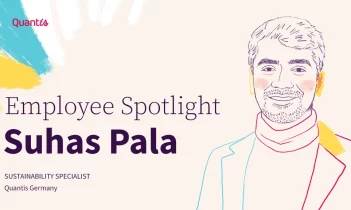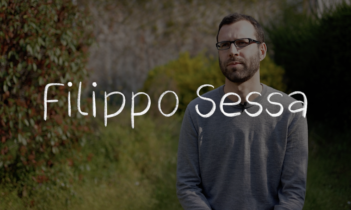
Rebekah Lees is the Stakeholder Engagement + Organizational Change Lead for Quantis Switzerland. We spoke with Rebekah about her background, current role, Quantis experience and what makes her unique.
Tell us a bit about your background and career path.
Rebekah Lees: I’ve had a bit of an unorthodox career path, which certainly didn’t start off in sustainability. After studying for a degree in French and business, and a year working in an oil refinery in northern France, I didn’t really know what I wanted to do with my career and my life. I joined one of the “Big Four” management consultancies, figuring that it would expose me to lots of different types of companies, industries and roles, and then eventually I’d be able to work out what I wanted to do.
At this point, sustainability wasn’t on my mind; it was such a small niche area of my firm’s business. Instead, I was restructuring banks through change management and organizational design. I did that for about six or seven years, and it ultimately helped me realize that I wanted to do something that interested me more!.
I’ve always had an affinity for language and words. I switched career paths at that point and found myself in the somewhat more glamorous world of PR. I managed to persuade a global communications and PR agency in London to give me a job, even though I had zero PR experience. The agency worked on a lot of global sustainability-related campaigns, including the launch of the UN Sustainable Development Goals.
While working there, I stumbled into sustainability. It was actually a happy accident; I ended up stepping into the lead role on a project at the last minute. It was a campaign by the Ellen MacArthur Foundation to raise awareness of the circular economy through the launch of a circular plastics initiative. From there, I was hooked and continued to seek out sustainability-related projects. I spent the next seven years working on big, creative sustainability communications campaigns, raising awareness for all sorts of sustainability-related issues, from renewable energy to green impact investing.
How did you hear about Quantis?
RL: After seven years at the agency, I wanted to find a job where I could solely work on sustainability-related topics and get more under the skin of some of the issues. That’s essentially what led me to Quantis.
I made the move from London to Switzerland. I took six months off, and I went skiing for a season. Something clicked for me when I read the job description at Quantis. I thought it described my experience and what I wanted to do perfectly, and here I am. That was just over two years ago.
What’s your favorite thing about working at Quantis?
RL: The people. It is such a cliché, but in this case it’s true and is something that’s really important to me. You spend a large part of your life working, so I find the dynamic with your colleagues and the people that you’re surrounded by on a daily basis to be so important. Quantisians (as we’re affectionately known) have a genuine passion for sustainability and a depth of knowledge that’s so inspiring. There’s also the propensity for kindness that you don’t always get in organizations. It’s something I absolutely value about Quantis.
On the work side of things, I appreciate the opportunity to work on genuinely transformative work. One of the first projects I started working on at Quantis — and have been working on ever since — is the EcoBeautyScore. It’s an industry-transforming initiative aimed at communicating the environmental impact of everyday products to consumers. Through a label displayed on cosmetics and personal care products, we aim to help consumers understand a product’s environmental impact and make conscious purchasing decisions. For example, when they’re choosing between two shampoos, and one scores an A whereas the other scores a B, they’re hopefully going to choose the less impactful one. It’s really exciting, the idea that whenever these labels appear on a product, I know I’ve played a small part in bringing it to a huge industry and to consumers globally.
What role do communications and engagement play in sustainable business transformation? Why do you think it’s often not prioritized the way it should be?
RL: It plays a critical role in sustainable business transformation. At the end of the day, businesses are made up of people, and it’s these people who need to understand the change that’s required and what their role is in making that happen. Without that understanding, nothing will happen and nothing will change. So, I don’t think it’s an exaggeration to say that sustainable business transformation simply wouldn’t happen without communications.
But communication isn’t always done in the right way. We can’t simply tell people what is happening, because that doesn’t necessarily change behaviors. We need to draw on people’s imaginations, so storytelling is hugely important. In order to take the steps necessary to tackle the climate crisis, we need to be able to tell stories of a future that people can imagine themselves living in. We need to be telling stories that really motivate people, rather than scaremongering.
Outside of the office, what are your passions?
RL: I live in the mountains here in Switzerland, so skiing is a big part of my winter life, both alpine and ski touring. In the summer, I love cycling, both road biking and mountain biking.
On the less active side, I suppose I could call it one of my “sustainability sins,” I’d have to say my shopping habit. However, this has become more sustainable. I now like to source great second-hand finds — there are so many stores now that have brilliant second-hand clothes or furniture. For me, that’s also a bit of a hobby — scouting for second-hand gems and selling my own items that I no longer wear or use. I’m trying to embody the circular economy (laughs).
What’s a fun fact that nobody knows about you?
RL: I have a mild obsession with the National Geographic documentary, “Air Crash Investigation.” I just find planes fascinating, and I enjoy the forensic process that the show goes through unpicking a historical aviation incident, exploring what went wrong, why and how it can be avoided in the future. I’ve watched almost every episode, so much so, I probably now have an encyclopedic knowledge of what can go wrong in an airplane!
Often, the documentary will reveal that the root cause of a plane crash in some part can be attributed to a breakdown in communication. The show highlights the importance of effective communication and this really resonates — not just in terms of preventing aviation disasters (!) but as a key piece to the puzzle of helping to mitigate environmental catastrophe as well.
Want your next career move to be with a growing international team, helping top organizations make the shift from business as usual to business at its best? Let’s talk!
Latest talent resources

Meet Suhas Pala
Suhas Pala is a sustainability consultant at Quantis in Berlin. We spoke with him about his journey, motivations, and his experiences at Quantis.

A conversation with Filippo Sessa
Meet Filippo Sessa, Italy Fashion & Sporting Goods Metrics Lead

A conversation with Luca Mosca
Meet Luca Mosca, a Senior Strategist from Quantis Italy
